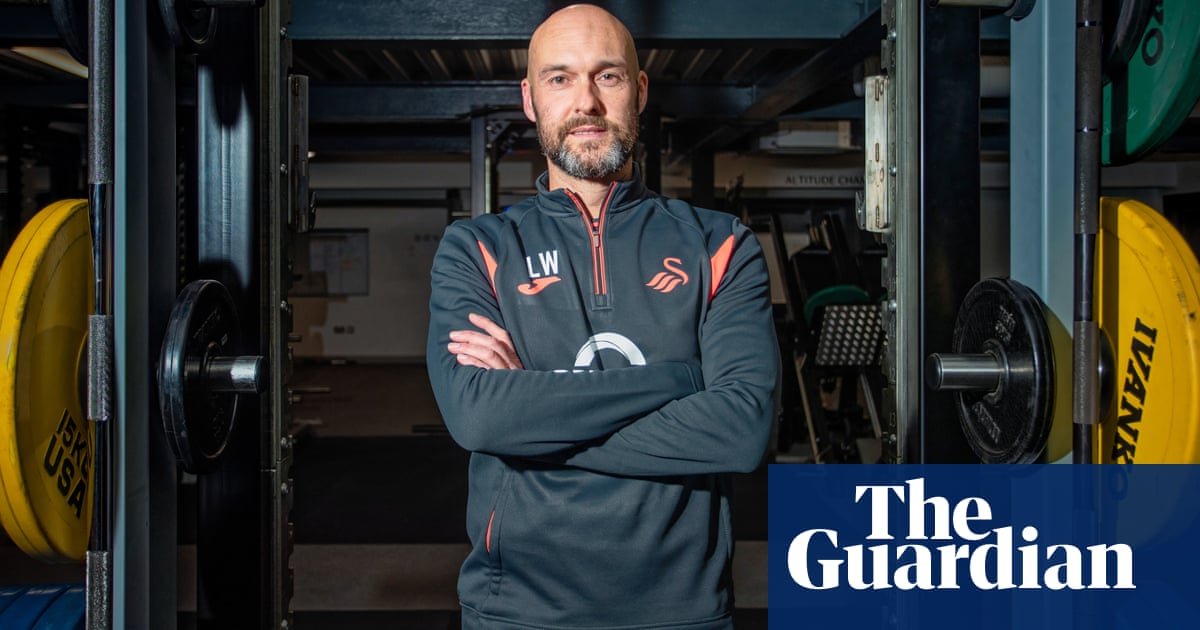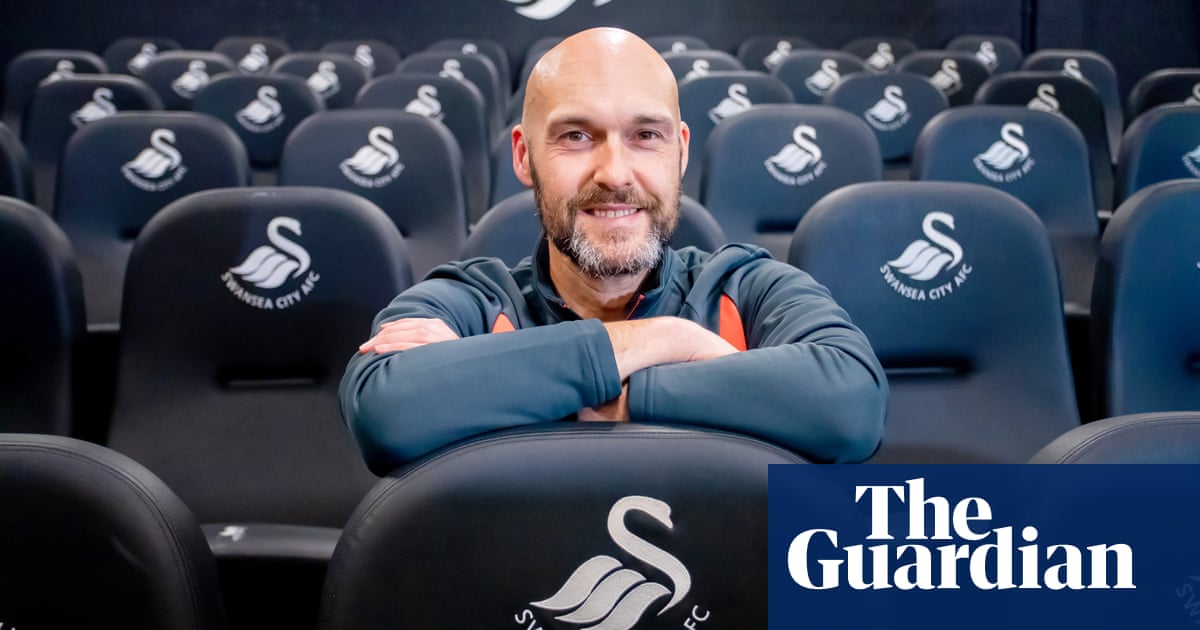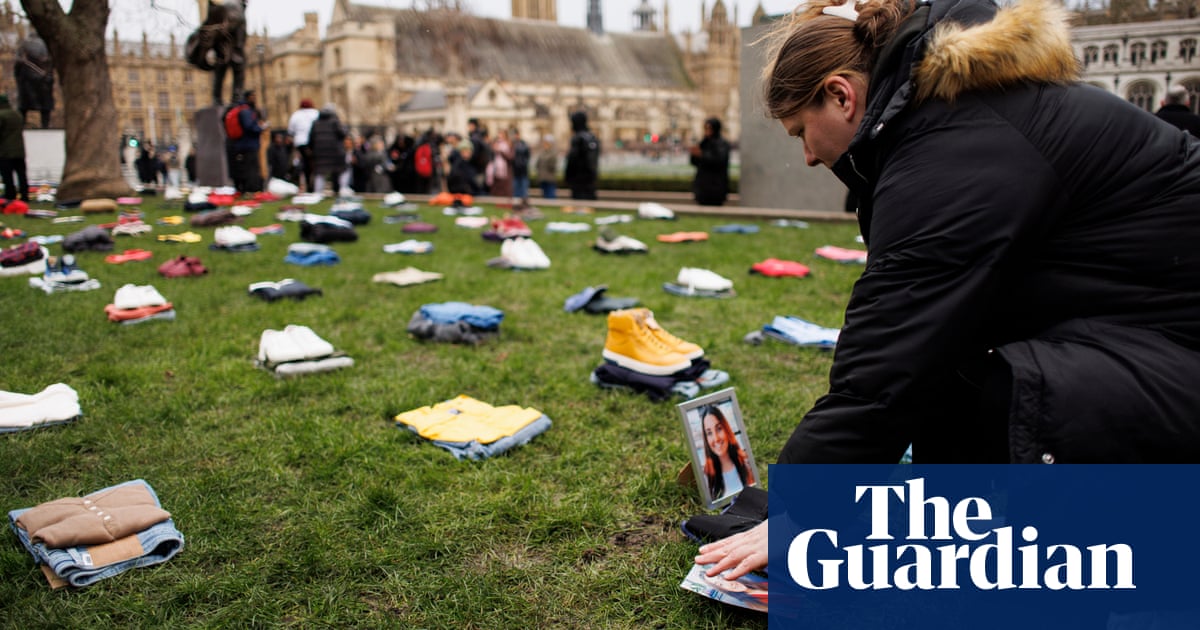
“Sometimes I would work 20 hours off the bat, get three or four hours’ kip, back to work,” says Luke Williams, the Swansea head coach, reflecting on the days when he would struggle to make ends meet, combining coaching kids in Hackney, east London, earning £1.50 a head, with loading lorries for British Home Stores on Highams Park industrial estate.
Odd jobs such as driving minibuses – from airport and nightclub runs to ferrying construction workers to the Olympic Park site in Stratford – paid the bills to fuel a burgeoning career. “Listen, nothing changes,” he says, smiling, glancing at the numbers on his Apple Watch after getting home from defeat at Leicester at 3am. “My sleep data from last night is three hours, 57 minutes.”
The number of sessions he has put on, he reckons, is into the thousands: from mini-kickers, four- and five-year-olds, to veterans and Swansea in the Championship, aged 43. It started aged 19 when, after failing to win a contract at Leyton Orient, he asked the club’s community arm whether he could do any coaching. He headed to London Fields every Saturday morning for the next 18 months, eventually coaching 40 to 50 kids. “Nothing is better for coming up with solutions than need, and I needed the money,” he says. “I came up with ways for more young kids to enjoy it and for their parents to come and watch and think: ‘My little boy got a bit of a kick today, he enjoyed it and came away with a smile.’ Then they tell their mate and you get £3 off that one bit of enthusiasm. I had to find a way for them to enjoy it and be happy so that when they finish [school] they are saying: ‘Miss, have we got football?’ Because I needed to get rebooked.”
Last season Williams clinched promotion with Notts County via a playoff final at Wembley, prompting Wrexham’s owners, Rob McElhenney and Ryan Reynolds, to reach out after an epic tussle at the top of the National League. “I thought it was a wind-up,” he says. “I was thinking: ‘Either it’s Ryan Reynolds or the person is an even better actor than Ryan Reynolds because he’s mimicking him so well.’” Then a return to Swansea beckoned, those 4am stints picking up partygoers at Oceana in Watford or Dukes in Chelmsford in an “old rattler with a big diesel engine” consigned to the past. “I’ve been to pretty much every racecourse in the country, but I’ve not been in … I was always sitting outside in the car park waiting for the punters.”
Williams makes captivating company over more than an hour of candid conversation, only at the end of which he tells the harrowing story of being struck on the head then stabbed with a champagne flute on a night out in Edmonton, north London, while an apprentice at Bristol Rovers. “I probably suffered with PTSD for a number of years without knowing,” he says. In his early 20s, a car crash left him with a fractured skull and broken hip. “I lost control of the vehicle and I managed to shear a lamppost four and a half feet from the ground. I hit a kerb and took off …”
After five rounds of knee surgery put paid to his hopes of a playing career, coaching proved a ticket to survive after leaving school at 16 without GCSEs. He excelled in sport, representing the school football team, but felt marginalised in the classroom. “I’m ashamed to say it but I’ve never handed in a piece of homework. Ever. I didn’t turn up for most of my exams and the ones I did, I was ungraded, got Us on the examination sheet.” He remembers a frank conversation with an employment agency, in which they asked after his qualifications, leading him into manual labour. Does his work ethic stem from failing to achieve as a youngster? “I’ve never thought of it in that way but in my opinion motivation in life is everything,” he says.
“The realisation in my late-teens that life is going to be a monumental struggle for me, that life was about to become very tough and the world would become very hostile for somebody with no qualifications, no contacts, working class … that desire to feed myself and look after myself kicked in. I realised that I was capable of tolerating almost anything, providing that I would be able to have a roof over my head and something to eat. That is how the motivation began. I don’t think I’ve really moved away from that. I still feel as insecure in that way as I ever did.”
Perhaps that explains the, on the face of it, surprising step he took after departing his role as assistant manager to Russell Martin at Swansea two years ago. “I applied to a company called Access Training, to see if I could get on an electricians’ course,” he says. “When I turned up at Notts County, they gave me the shirt to take the [announcement] picture. Normal, no? I held the shirt up … Access Training are the shirt sponsors of the kit. They still email me now with discounts on courses for Level 1 electrics. For the time being I don’t need to enrol because I have a job.”
His immediate focus is on trying to earn his first league win against Plymouth on Saturday, a game Swansea have dedicated to the Maggie’s cancer charity. While in his first management post, at Swindon, Williams was struck by the spirit of a man known as “Ammo”, a former artilleryman diagnosed with terminal cancer. Ammo was invited by the club to work as the kit man until he could no longer. Williams visited him in a hospice and attended his funeral.
“I already loved the mentality of being a warrior and not a victim but he just took it to a totally different level,” he says. “He must have weighed 8st but he would pick up all the boots on his own – he wouldn’t take any help. We’d get back in the early hours from an away trip and he would be in the next morning before everybody else. He never missed a beat. I learned a huge amount from him without him ever really knowing, which is quite sad. We need these incredible charities that can somehow make this terrible situation more bearable for the people affected.”
Those early starts for BHS helped pay rent but proved unfulfilling. “One of the guys I worked with would arrive every morning, rain or shine, in shorts and a T-shirt and leave fully clothed: jacket on, two jumpers, a pair of trousers. The bar wasn’t very high, is what I’m saying. If you turn up and you work hard every day and you don’t steal everything, you can shine. When you realise that coaching is more rewarding than working in a warehouse, you think: ‘I’d rather trade the warehouse hours for coaching hours.’ I thought: ‘I better get really good at coaching, then.’”
He took on work for West Ham, coaching young offenders as part of their community programme. “I worked for West Ham in the day and I took the under-14s at Orient in the evenings, so it was a bit of a conflict of interest but I was always ducking and diving,” he says, laughing. He combined those roles with working for Braintree College. “Bewildering … I did everything I could to get out of the classroom as a kid and suddenly I was in a teaching assistant role.”
At the time Williams – whose father, John, is “probably the oldest cab driver in London” – was living hand to mouth. His “incredible” mother, Kate, worked as an administrative assistant. In his mid-teens Williams and his elder brother, John, buffed floors and cleaned windows at a school during the holidays. At 19, he and his brother moved into a flat in Hermitage Court, Wanstead.
“We could only afford somewhere that wasn’t rented through an agency, because it wouldn’t have passed any of the regulations,” he says. “The boiler didn’t work. We would sleep in all our clothes, in hats and scarves. It had single-glazing so in the winter the condensation would freeze, so you would have ice on the inside of the windows. We left cash on the mantelpiece for the landlord. I actually remember it fondly, believe it or not.” Because it was all he knew? “Pretty much. We knew it was dire, but it was ours.”
Williams also coached at Brighton and Bristol City before being headhunted by Notts. Until then, being a manager never crossed his mind. “I’d always worked in the shadows,” he says. “It wasn’t an ambition: ‘Now I’m ready to be my own man.’ I would still be taking the under-21s at Brighton for Gus Poyet if Gus was still there. If you show up and try hard enough, someone always has work for you and might give you a chance – that has been my motto for life. Try really hard in whatever job you’ve got, stacking lorries or managing Swansea.”












